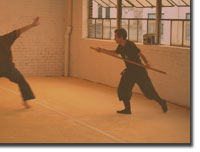Guidelines for Participation in the Bujinkan
1. The Bujinkan shall be open to only those who agree with and uphold the guidelines of the Bujinkan Dojo. Those not doing so shall not be allowed to join. Specifically: Only those who have read and agreed with these guidelines shall be allowed to participate.
2. Only those able to exercise true patience, self-control, and dedication shall be allowed to participate. A physician's examination report shall be required. Specifically, individuals with mental illness, drug addiction, or mentally instability shall be barred from joining. The necessity of such a report concerns individuals who may present a danger to others, for example, those with infectious diseases or illnesses, individuals with clinically abnormal personalities or physiology, and individuals lacking self-control.
3. Individuals with criminal records shall be turned away. Trouble makers, those who commit crimes, and those living in Japan who break domestic laws shall be turned away.
4. Those not upholding the guidelines of the Bujinkan, either as practitioners or as members of society, by committing disgraceful or reproachable acts shall be expelled. Until now, the Bujinkan was open to large numbers of people who came to Japan. Among them, unfortunately, were those committing violent drunken acts, the mentally ill, and trouble makers who thought only of themselves and failed to see how their actions might adversely affect others. Through their actions, such people were discarding the traditional righteous heart of the Bujinkan. From this day forward, all such people shall be expelled.
5. Regarding accidents occurring during training (both inside and outside the dojo), one should not cause trouble to the Bujinkan. This is an extremely important point. Those unwilling to take personal responsibility for accidents occurring during Bujinkan training shall not be admitted. Reiterating for clarity, the Bujinkan shall not take responsibility for any accidents happening in the course of training, regardless of the location.
6. All those joining the Bujinkan must get an annual member's card. This card not only preserves the honor of the Bujinkan members, it indicates you are part of a larger whole - one whose members come together with warrior hearts to better themselves through training and friendship. It evinces the glory of warrior virtue, and embodies both loyalty and brotherly love.
7. The tradition of the Bujinkan recognizes nature and the universality of all human life, and is aware of that which flows naturally between the two parts:
"The secret principle of Taijutsu is to know the foundations of peace." "To study is the path to the immovable heart (fudoshin)."
Recently, the Bujinkan has become truly international. Just as there are various time zones, so exist various taboos among the world's peoples and nations. We must respect each other, striving to avoid such taboos. We must put the heart of the warrior first, working together for self-improvement and for the betterment of the Bujinkan. Those not upholding the above-mentioned guidelines shall be forced out of the Bujinkan.
Masaaki Hatsumi - Soke

